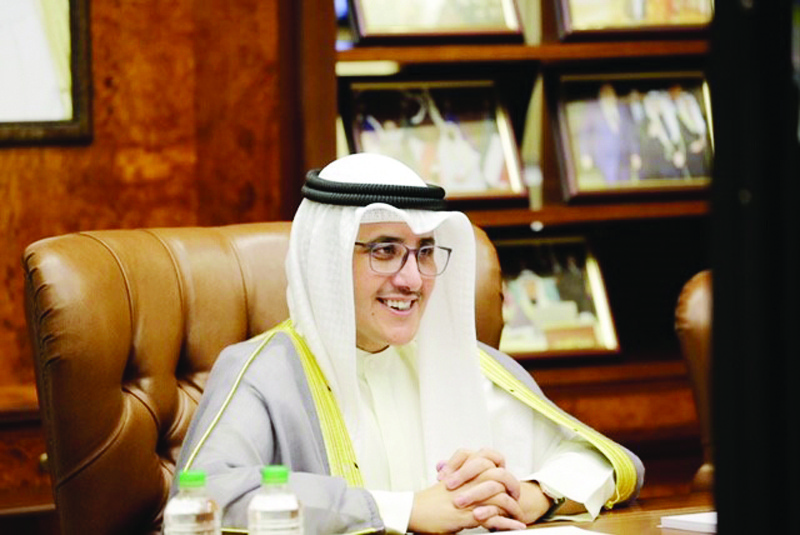
KUWAIT: Kuwait on Thursday hosted the fourth session of the Kuwait-UAE Joint Higher Committee via videoconference. Kuwait's Foreign Minister and Acting Minister of Information Sheikh Dr Ahmad Nasser Al-Mohammad Al-Sabah headed the Kuwaiti side to the committee, while UAE's Foreign Minister and International Cooperation Sheikh Abdullah bin Zayed Al-Nahayan led the Emirati delegation.
In his speech, Sheikh Ahmad Nasser Al-Mohammad said: "At the beginning of this meeting as we are meeting under these exceptional conditions, I'm pleased to welcome you all in my name and on behalf of all members of the Kuwaiti delegation participating in the fourth session of the joint higher committee between the State of Kuwait and its sisterly United Arab Emirates. Thank you all and I appreciate your keenness to take part virtually in this important meeting. We pray to Allah Almighty to help us in our job."
He added that he seized this opportunity to thank all sister and brother members of the Preparatory Committee for all efforts they made in distinguished preparation for the committee that contributed to facilitating its work. "This reflects our common desire to advance the strong and solid relations that unite our two brotherly countries in light of the wise and sound directives of our leaders, His Highness the Amir Sheikh Nawaf Al-Ahmad Al-Jaber Al-Sabah, may Allah preserve and protect him, and his brother His Highness Sheikh Khalifa bin Zayed Al Nahyan, the President of the sisterly United Arab Emirates, may Allah preserve and protect him," he noted.
"Sheikh Abdullah bin Zayed, it pleases me to recall proudly the outstanding stations that have contributed to the consolidation of the bilateral relations between the two brotherly countries. Our sisterly ties have been promoted and consolidated due to the courageous historical stances by the UAE during the Iraqi occupation of Kuwait in 1990 and its support for Kuwait to get its right in the most difficult circumstances as well as its relentless endeavor for the liberation of the State of Kuwait through the great sacrifices and services provided by the government and people of the UAE that will remain eternal in the history of the relationship between the two brotherly countries," he stressed.
Honorable stances
The late Sheikh Zayed bin Sultan Al Nahyan, may Allah rest him in peace, made honorable stances during the occupation of Kuwait that mirrored his keenness on the relations between the two brotherly countries, the minister stated. Under the leadership of the late Sheikh Zayed bin Sultan, the sisterly country of the UAE hosted tens of thousands of the Kuwaiti families on its lands and raised the Kuwaiti flag at that time on its official headquarters, he pointed out.
The minister went on to say that Sheikh Zayed bin Sultan made the national anthem of the State of Kuwait play alongside the national anthem of the United Arab Emirates, in addition to his decision on the Emirati forces' participation in the war to liberate the State of Kuwait, adding that all these are honorable stations that will remain in the memory of Kuwait and Kuwaitis forever.
"Sheikh Abdullah bin Zayed Al-Nahayn, the Kuwaitis undoubtedly are proud of, and admire the wise leadership of His Highness Sheikh Khalifa bin Zayed Al Nahyan, and the role that he plays with his brothers, the rulers of the United Arab Emirates, in the advancement of the country that has gained a regional and international status through its balanced policies, and due to its economic and developmental achievements," Sheikh Ahmad Nasser Al-Mohammad said.
"Speaking about several achievements and many initiatives launched by the UAE in varied domains, we express our great pride for these accomplishments and initiatives launched by the UAE in space through launching several satellites, sending the first Emirati and Arab astronaut to the International Space Station and developing the UAE project to explore Mars and the Hope Probe, a mission aiming to reach the orbit of Mars by 2021," he made clear.
Kuwait congratulates the sisterly United Arab Emirates on the celebration of the start of operating the first station of Barakah Nuclear Energy Plants, he said, voicing delight at this remarkable achievement in the field of producing electrical energy from peaceful and environmentally friendly nuclear energy.
This reflects the progress made by the UAE in this field and is a translation of the insightful vision of the political leadership with the efforts of the young Emiratis, he said. Also, this will undoubtedly contribute to promoting the economies of the UAE and the Gulf Cooperation Council countries, the minister pointed out.
Facing challenges
Sheikh Ahmad Nasser highlighted the peculiarity of the strong Kuwaiti-UAE relations and the two countries' pursuit for integration on all vital domains to face challenges and meet the aspirations of their people. The foreign minister thanked the UAE for hosting and facilitating the return of Kuwaiti travelers who were stranded abroad during the coronavirus pandemic.
He unveiled that Kuwait will participate in the Dubai Expo with its largest ever pavilion in such events, stressing his country's eagerness to see the success of UAE-hosted international exhibition. Sheikh Ahmad expressed satisfaction with the level of cooperation between the two GCC states. He pointed out that some 730 Kuwaiti undergraduate students are studying in the UAE universities and academies.
The minister noted that since 1972 the two countries have signed 33 cooperation agreements that covered a wide array of domains. He disclosed that in today's meeting the two countries inked three memoranda of understanding and one executive programs for joint cooperation. He stated that the trade exchange between Kuwait and UAE in 2019 hit over KD one billion (roughly $3.27 billion).
He estimated the volume of the investments of the Kuwaiti Investment Authority in the UAE at KD 54.382 million (about $177.93 million). Following the meeting, the foreign ministers signed three memoranda of understanding for cooperation in higher education, education and Islamic affairs as well as an executive program for cooperation in arts and culture. - KUNA
.jpg)


